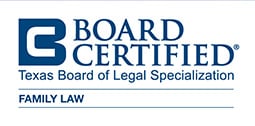Resolving Disputes That Affect The Parent-Child Relationship
When a marriage breaks down in a household with minor children, each parent often has concerns about the future of their parent-child relationship. The prospect of having less time with a child and potentially sharing responsibilities with an ex-spouse can be daunting. Disputes over custody, access and visitation between unmarried parents can be equally troubling. In suits affecting the parent-child relationship associated with divorce or paternity, or when substantial changes in circumstances occur after a final decree and possession order has issued, it is critical for a parent to work with a family law specialist to obtain the best possible results.
At the Law Office of William B. Doonan, with locations in Midland and Tarrant counties, we understand the struggles that parents face. Our founding attorney, William B. Doonan, is a board-certified family law specialist* who is well-qualified to fight to protect the rights of our clients in all aspects of family law matters. He works hard to prepare and present a strong case for efficient resolution in negotiations or mediation. He is highly skilled in taking each issue to trial when necessary. Our entire legal team adheres to a policy of transparency in communicating with clients. That means that we will explain the process and all of your legal options along with providing experienced guidance in order to obtain the best results at every step of the process.
The Complexity Of Child Custody Law
Texas law involving the rights and responsibilities of parents is complex. We help clients navigate the confusing terminology and the process to demystify the law and allow them to make informed decisions about all aspects of their family law cases. Child custody matters include several aspects that may seem foreign to many Texans:
- Understanding child custody in Texas – Legal custody is referred to as conservatorship under the family code. Texas law does not favor one parent over the other as a rule. It is public policy to maintain a continuing relationship between children and both parents as long as the evidence shows that each parent is capable of providing a safe, stable and nonviolent environment for the children. Courts may name parents as joint managing conservators. However, when the circumstances warrant that one parent makes the important decisions in raising the child, that court may name that parent as the sole managing conservator.
- Understanding access and visitation in Texas – A person with the right to access has the legal right to approach, communicate and interact with the child, but does not have the right of possession. “Possession” essentially is visitation or parenting time, where the person with the right to possession takes control of the child to the exclusion of the other parent for the period of time outlined in the possession order.
- Understanding possession orders in Texas – Texas courts issue possession orders that govern child custody matters. Essentially, a possession order outlines the parenting time or visitation plan related to the child (or children). A standard possession order identifies the presumptive amount of time a possessory conservator or a joint managing conservator will have with a child who is of the age of 3 or older. While there are guidelines for outlining the terms and conditions, an order may deviate from the standard possession order based on the individual circumstances.
In all matters involving children, the best interest of the children are of paramount importance. To ensure that your parental rights are secure, it is imperative to have a legally binding agreement or court order regarding child custody and visitation rights. We have substantial experience obtaining meaningful results for clients in Midland, Tarrant and surrounding counties.
Post-Decree Custody Modifications
Circumstances often change for parents or children as time passes after a divorce. The terms of an existing possession order that no longer reflect the current circumstances may be modified to fit the best interest of the child. Generally, the court may modify a conservatorship or possession order if material and substantial changes of the child, a conservator or another party affected by the order have occurred. Any changes must serve the best interest of the child. We fight for clients seeking to modify or challenge a request to modify existing custody orders.
Turn To A Board-Certified Family Law Attorney To Resolve Your Custody Dispute
To learn more about how we can help you protect your parent-child relationship, contact the Law Office of William B. Doonan. In the Tarrant County and Keller/Ft Worth area, call 817-898-7242. In the Midland area, call 432-570-9949. You may also request a case evaluation online.
*Attorney William B. Doonan is board-certified in family law by the Texas Board of Legal Specialization.


